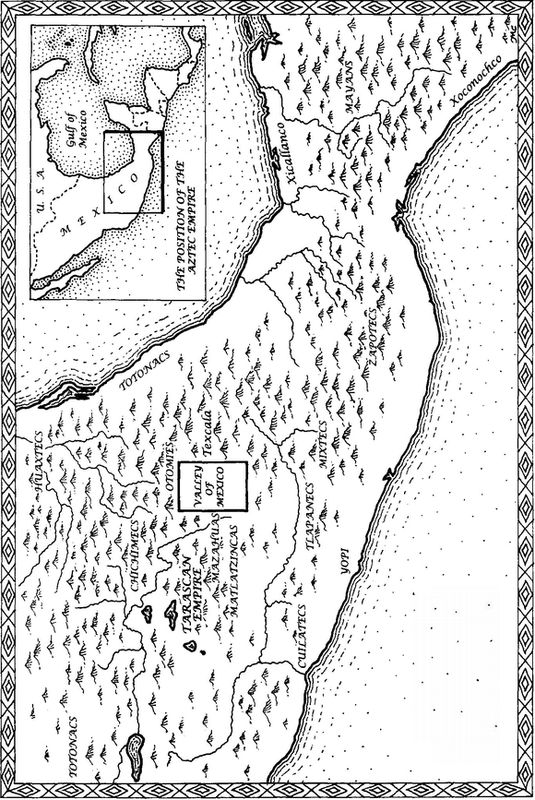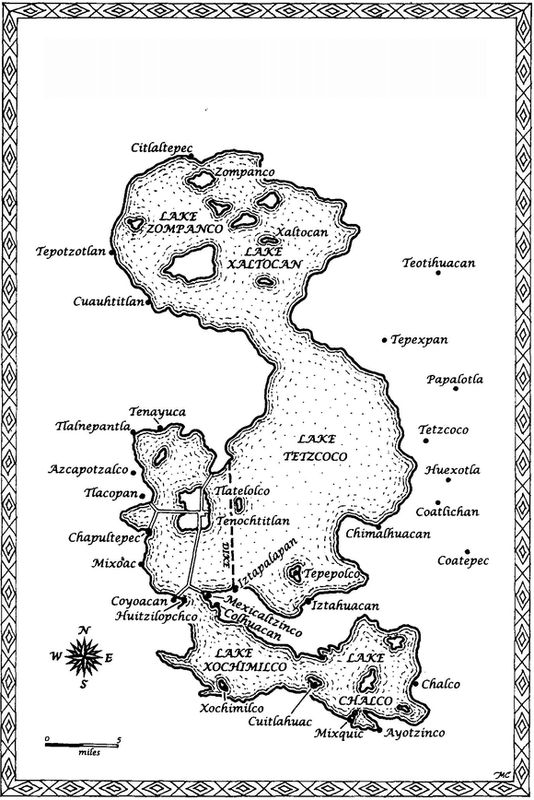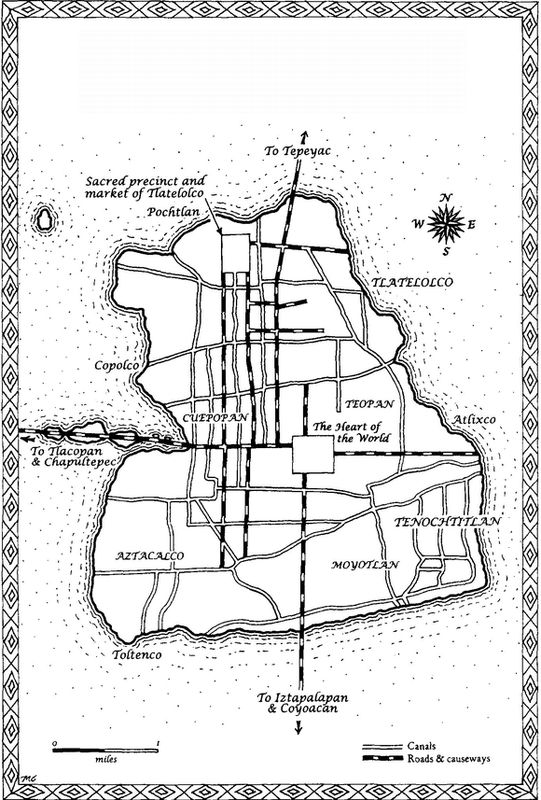The Demon of the Air (33 page)
Read The Demon of the Air Online
Authors: Simon Levack

“So you worked out that Shining Light faked his own kidnapping? That's amazing. Mind you,” Lion added, in what for him was a thoughtful tone, “you were bound to find out who he was eventuallyâhe'd have wanted you to know before he killed you. It's strangeâeven I never hated you that much!”
“Hate? I don't know, Lion. He might have said it was love. His mother told me once he had so much love in him. Maybe he had too much love for Nimble, maybe that was his trouble.”
My brother gave a noncommittal grunt. “I'm not sure that's the word I'd use for it.”
The splashing had resumed, in a firm, steady rhythm that told us Handy had taken over the paddle. We both looked at the approaching
canoe and its occupants: the sturdy commoner, the vile old man scowling in the stern, and between them the pale face of the woman. She was too far away for me to see her expression, but I could imagine it: the tight-lipped, impassive, distant look she had worn when we had first met.
canoe and its occupants: the sturdy commoner, the vile old man scowling in the stern, and between them the pale face of the woman. She was too far away for me to see her expression, but I could imagine it: the tight-lipped, impassive, distant look she had worn when we had first met.
“He's going to get away with it, isn't he?” My brother had eyes only for my master, and his voice was full of venom.
I did not reply. I was not much interested in the Chief Minister; tomorrow would be a good time to worry about him. It was the woman I was looking at, her pale features exaggerated and made angular by the night's deep shadows, as the boat brought her closer to us. What was going through her mind?
We had each lost a son. Was it worse, I wondered, to bring your child up, nurture him, love him for his faults and virtues and see him dead at your feet, or to find a child you had never known you had, only to lose him again that same night?
I barely noticed the thump as the canoe came to rest against the great boat's side. Handy scrambled aboard with a rope, and he had to greet me twice before I answered him.
All I could see or hear then was my son, out there somewhere, running for his life.
The murderer is cruel, a dog at heartâa dog indeed. He is a hater of people, a troublemaker, a killer, a spy, a tempter. Daring, he is rash, brutal, disorderly. He bears false witness; he accuses people; he hates, slanders, calumniates, libels them. He strikes, he charges at them; he kills, he leaves his mark on them. He is a demon of the airâa demon. He sheds blood.
Â
The Florentine Codex, Book X
THE AZTEC EMPIRE

VALLEY OF MEXICO

MEXICO-TENOCHTITLAN

The Aztecs lived in a world governed by religion and magic, and their rituals and auguries were in turn ordered by the calendar.
The solar year, which began in our February, was divided into eighteen twenty-day periods (often called “months”). Each month had its own religious observances associated with it; often these involved sacrifices, some of them human, to one or more of the many Aztec gods. At the end of the year were five “Useless Days” that were considered profoundly unlucky.
Parallel to this ran a divinatory calendar of 260 days divided into twenty groups of thirteen days (sometimes called “weeks”). The first day in the “week” would bear the number 1 and one of twenty namesâReed, Jaguar, Eagle, Vulture and so on. The second day would bear the number 2 and the next name in the sequence. On the fourteenth day the number would revert to 1 but the sequence of names continued seamlessly, with each combination of names and numbers repeating itself every 260 days.
A year was named after the day in the divinatory calendar on which it began. For mathematical reasons these days could bear only one of four namesâReed, Flint Knife, House and Rabbitâcombined with a number from 1 to 13. This produced a cycle of fifty-two years at the beginning and end of which the solar and divinatory calendars coincided. The Aztecs called this period a “Bundle of Years.”
Every day in a Bundle of Years was the product of a unique combination of year, month and date in the divinatory calendar, and so had, for the Aztecs, its own individual character and religious and magical significance.
The date on which this book opens is 9 December 1517; in other words, Thirteen Grass in the week beginning One Flower, the twentieth and last day of the Month of the Raising of Banners, in the year Twelve House.
The Aztec language, Nahuatl, is not difficult to pronounce, but is burdened with spellings based on sixteenth-century Castilian. The following note should help:
| Spelling | Pronunciation |
|---|---|
| c | c as in “Cecil” before e or i; k before a or o |
| ch | sh |
| x | sh |
| hu, uh | w |
| qu | k as in “kettle” before e or i; qu as in “quack” before a |
| tl | as in English, but where “-tl” occurs at the end of a word the l is hardly sounded. |
The stress always falls on the penultimate syllable.
Â
I have used as few Nahuatl words as possible and favored clarity at the expense of strict accuracy in choosing English equivalents. Hence, for example, I have rendered
Huey Tlatoani
as “Emperor,”
Cihuacoatl
as “Chief Minister,”
calpolli
as “parish,”
octli
as “sacred wine” and
maquahuitl
as “sword,” and have been similarly cavalier in choosing English replacements for most of the frequently recurring personal names. In referring to the Emperor at the time when this story is set I have used the most familiar form of his name, Montezuma, although Motecuhzoma would be more accurate. To avoid confusion I have called the people of Mexico-Tenochtitlan “Aztecs” rather than “Mexicans.”
Huey Tlatoani
as “Emperor,”
Cihuacoatl
as “Chief Minister,”
calpolli
as “parish,”
octli
as “sacred wine” and
maquahuitl
as “sword,” and have been similarly cavalier in choosing English replacements for most of the frequently recurring personal names. In referring to the Emperor at the time when this story is set I have used the most familiar form of his name, Montezuma, although Motecuhzoma would be more accurate. To avoid confusion I have called the people of Mexico-Tenochtitlan “Aztecs” rather than “Mexicans.”
The name of the principal character in the novel, Yaotl, is pronounced “YAH-ot.”
With such wonderful sights to gaze on we did not know what to say, or if this was real that we saw before our eyes. On the land side there were great cities, and on the lake many more. The lake was crowded with canoes. At intervals along the causeway there were many bridges, and before us was the great city of Mexico.
Â
âBernal Diaz del Castillo,
The Conquest of New Spain
The Conquest of New Spain
Â
On 8 November 1519 the Conquistadors, led by Hernan Cortés, entered the Aztec capital, Mexico-Tenochtitlan. They were astonished by what they saw, these first Europeans to set eyes on the greatest city of the New World. Their astonishment can only have grown in the succeeding days and months, fueled by the sight of the whitewashed houses, the gardens, the temples, the palaces, the markets and above all the sheer numbers of people milling around them. The twin cities of Tenochtitlan and Tlatelolco alone were home to more men and women than the Spaniards would ever have seen in one place, and daily perhaps as many more would have poured onto the island the cities stood on, either by canoe across the surface of its surrounding lake or on foot via the causeways linking it to the shore, bringing tribute or produce or goods to trade in its markets.
The Conquistadors would have been still more amazed if they had appreciated that the vast metropolis before them had been founded less than two hundred years before by a wandering tribe of despised barbarians, and that the mighty empire whose heart it was had existed for less than a century. The Aztecs did not live in some ancient, decadent,
ossified society: theirs was a young, vigorous state, still expanding and seeking new conquests, and it would have carried on growing but for the irruption of Cortés and his men.
ossified society: theirs was a young, vigorous state, still expanding and seeking new conquests, and it would have carried on growing but for the irruption of Cortés and his men.
Within two years of that day in 1519âon 13 August 1521, to be exactâit was all over. Nearly all the magnificent buildings that had so impressed the Spaniards were reduced to rubble, and in the struggle to possess them many of their inhabitants had perished of European diseases such as smallpox, to which native Americans had no immunity, of hunger or thirst as the invaders besieged their city and cut off its water, or of Toledo steel.
But this novel is not about the conquest. It is about the conquered: the extraordinary people we call the Aztecs, whose own name for themselves was the Mexica, or Mexicans. It is a modest attempt to bring their city back to life in all its beauty and brutality: from the poetry and flowers and exquisite feather-work they adored to the human blood they believed they had to shed to pay their debt to the gods.
It opens nearly two years before Cortés's arrival, in the winter of 1517, the year the Aztecs called Twelve House. This was the year when a Spanish expedition first made contact with the Mayans in the Yucatan peninsula, and rumors of pale-skinned men with beards began to trouble the dreams of Montezuma, the Emperor of Mexico.
THOMAS DUNNE BOOKS.
An imprint of St. Martin's Press.
DEMON OF THE AIR. Copyright © 2004 by Simon Levack. All rights reserved. No part of this book may be used or reproduced in any manner whatsoever without written permission except in the case of brief quotations embodied in critical articles or reviews. For information, address St. Martin's Press, 175 Fifth Avenue, New York, N.Y. 10010.
Â
Â
First published in Great Britain by Simon & Schuster UK Ltd.
Â
Â
eISBN 9781466809963
First eBook Edition : January 2012
Â
Â
The extract from
The Florentine Codex, A General History of the Things of New Spain,
by Bernadino de Sahagun and translated and edited by Arthur J. O. Anderson and Charles E. Dibble, is reproduced by kind permission of the University of Utah Press and the School of American Research.
The Florentine Codex, A General History of the Things of New Spain,
by Bernadino de Sahagun and translated and edited by Arthur J. O. Anderson and Charles E. Dibble, is reproduced by kind permission of the University of Utah Press and the School of American Research.
The extract from
Fifteen Poets of the Aztec World
by Miguel Leon-Portilla is reproduced by kind permission of the publishers, University of Oklahoma Press.
Fifteen Poets of the Aztec World
by Miguel Leon-Portilla is reproduced by kind permission of the publishers, University of Oklahoma Press.
The extract from
The Conquest of New Spain
by Bernal Diaz del Castillo is from the 1963 translation by J. M. Cohen, published by Penguin Books, Ltd.
The Conquest of New Spain
by Bernal Diaz del Castillo is from the 1963 translation by J. M. Cohen, published by Penguin Books, Ltd.
Library of Congress Cataloging-in-Publication Data
Levack, Simon.
Demon of the air : an Aztec mystery / Simon Levack.â1st U.S. ed. p. cm.
ISBN 0-312-34834-7
EAN 978-0-312-34834-2
1. Montezuma II, Emperor of Mexico, ca. 1480â1520âFiction. 2. Indians of MexicoâFiction. 3. Human sacrificeâFiction. 4. Emperors-Fiction. 5. SlavesâFiction. 6. MexicoâFiction. 7. AztecsâFiction. I. Title.
PR6112.E886D46 2005
813'.6âdc22
2005043976
First U.S. Edition: September 2005
Other books
The Summons by Peter Lovesey
Fanning the Flame by Kat Martin
Shades of Pleasure: Five Stories of Domination and Submission by Tawny Taylor
Lulu Bell and the Koala Joey by Belinda Murrell
Going It Alone by Michael Innes
Hold the Pickles by Vicki Grant
Star Slave by Nicole Dere
Into Thin Air by Jon Krakauer
Dark Don't Catch Me by Packer, Vin
Knock Out (A Reynolds Security Novel) by Melissa Hale